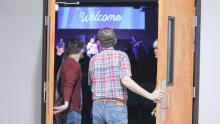mainline denominations

In July, Ryan Burge, an associate professor of political science at Eastern Illinois University and an ordained minister in the American Baptist Church, made a case on his Substack that, with the exception of the rise of those who identify as non-religious or “nones,” the most important trend in American religiosity is the rise of nondenominational churches. For those who are actively engaged in denominational life, the numbers are staggering.
When taken together, those attending nondenominational churches now make up the second largest religious group in the United States after Roman Catholics. Rising from a mere 5 percent of the U.S. religious landscape in 1984, nondenominational adherents are now estimated to represent an astonishing 22 percent.

Chances are you’ll see a bunch of folks walking around with shmutz on their foreheads this Wednesday. The ‘Splainer asks what having a dirty forehead has to do with being a Christian and why this ritual is gaining in popularity.
Q: Excuse me, but why do you have dirt on your forehead?
A: Wednesday is Ash Wednesday, the day many Christians mark as the first day of Lent, the time of reflection and penitence leading up to Easter Sunday. Clergy all over the world dispense ashes, usually made by burning the palm fronds distributed on last year’s Palm Sunday, making the sign of the cross on the bowed foreheads before them. As they “impose” or “dispense” the ashes, the pastor or priest reminds each Christian of Genesis 3:19: “For dust you are and to dust you shall return.”
Q: Well, that’s cheerful. Why would anyone want to start a workday on such a downer?
A: It isn’t intended to be a downer. It’s supposed to be a reminder that our lives are short and we must live them to the fullest. OK, maybe it’s a little bit of a downer — that verse from Genesis is what God said to Adam and Eve when he expelled them from the Garden of Eden for their sins. But there’s a big party the night before Ash Wednesday. That’s Mardi Gras, or “Fat Tuesday,” a secular observance that evolved out of “Shrove Tuesday,” the last hurrah – usually marked by eating of pancakes or other sinfully sweet foods – before the solemnity and penance of Lent set in.

A lot has been written about the decline of the mainline church over the years. Numerous theories have been passed around. Nearly every pew-sitting faithful Christian in America has her or his own opinion. As a minister I have heard a lot of these complaints from the masses; the request is simple. They want the church to be the center of social and political life as it seemed to be in the 1950s and 1960s. They want the pews packed with people, the nursery overflowing with babies, and the church to have the same level of particularity that it did years ago. The church today finds itself having to share time and attention with the rest of the world. Because of this (and numerous other factors), the church for the most part has seen the number of people attending the hallowed halls of a church house begin to decrease.
In an effort to find a culprit for the shrinking size and popularity of church, a scapegoat has been named and they are "young people today” — a catchall term for people under the age of 35 (or thereabouts) who have seemingly left the church en masse.
They are vilified as the sole reason and cause for the church to not be busting at the seams with people. If only those "young people" could just stop being so selfish on Sunday mornings and just come to worship God at 11 a.m. like people have been doing for years, the world might be a better place.

Dear Church,
I received some distressing news today. Oh, I know you thought you’d kept it secret, but I answered the phone when the doctor’s office called to change your chemo appointment.
Chemo? Seriously? What, you thought I wouldn’t find out eventually? I know I seem preoccupied sometimes, but I’m not an idiot. I can see the signs.
I knew something was up when I saw you shrinking, little by little over time. Maybe other people couldn’t tell, but I suspected something bad was going on. You can paste on a smile, and listen to your happy music, and buy new stuff. But anyone who really knows you, realizes your body has been slowly betraying you.
Dying happens. I get that. What really makes me mad, though, is that you didn’t trust me enough to tell me. Maybe you didn’t know for awhile. I guess that’s possible. But the doctor had to have told you, right? I mean, at some point you decided to do something about it — if only to keep it a secret. And if you didn’t know, then you’re not who I thought you were.

To the Dying Church,
I hardly know what to say. Watching someone you love, who helped raise you, who cared for you when you weren't well, who partially defined who you would be, slowly perish before your eyes is difficult to say the least. I love you. I don't want to lose you.
But, this is life. These things happens. Those you love do die. It's just how it works. I mean, there were churches before you. They may not have looked like you or sung songs like you or taught exactly what you do, but they all had Love – just different ways of expressing it. They changed people's lives. They made some people better people and, sometimes, they made people worse people. Then, they died.
In all of it, Love was there somewhere hoping to be valued, hoping to be expressed, hoping to be shared.
Standing at the foot of your bed as you struggle to hold on, fight to catch a few last breaths, is uncomfortable and wonderful, all at the same time. Remembering the twinkle in your eye from my childhood, the liveliness of your step is as beautiful and heartbreaking a thing as I can think of in this moment.
Death sucks.

I am part of a liturgically worshiping tradition. There are days I wish I wasn’t; days when our Kyrie is lacking splendor and our Eleison feels redundant; moments that I wish we could get to the important stuff — my inspired and infallible message (I kid) — and toss the unending Psalm or Prayers of the Church.
And then there are the other times, when I am guiltily reminded that cutting the creed means missing out on the same words spoken by millions of believers before me. Or when the music just all works and my heart is stirred by the Hallelu– (shhh, its Lent) Chorus.
So I like to remind my community of believers from time to time why we do what we do. I have long felt the risk of liturgy is that it becomes rote narration, a thoughtless speechifying of sorts. So that this might be avoided, here are my thoughts on the creeds and why a corporate confession of faith is still valuable today.

Life inside a bubble can feel complete, even dynamic, as the bubble’s surface shimmers and yet retains form.
When the surface is breached, the bubble collapses immediately, shattering into a liquid spray faster than a metal object can fall through where it used to be. What looked like a permanent structure is, in fact, uncertain and quickly lost.
We saw a ”tech bubble” burst 13 years ago. What had seemed durable and laden with value turned out to be vapor. The “housing bubble” came next. Some think another “tech bubble” is about to burst.
The bubble I see bursting is establishment Christianity in America. It is bursting ever so slowly, even as millions of people still find life, meaning, safety, and structure inside. But one failing congregation at a time, the surface of shimmering shape is being breached.

In recent days, conservatives have attacked the Episcopal Church. The reason? The church has just concluded its once every three-year national meeting, and in this gathering the denomination affirmed a liturgy to bless same-sex unions. Conservatives assert that the Episcopal Church's ever-increasing social and political progressivism has led to a precipitous membership decline and ruined the denomination.
Many of the criticisms were mean-spirited or partisan, continuing a decade-long internal debate about the Episcopal Church's future. However, New York Times columnist Ross Douthat broadened the discussion, moving beyond inside-baseball ecclesial politics to ask a larger question: "Can Liberal Christianity be Saved?"
The question is a good one, for the liberal Christian tradition is an important part of American culture, from dazzling literary and intellectual achievements to great social reform movements. Mr. Douthat recognizes these contributions and rightly praises this aspect of liberal Christianity as "an immensely positive force in our national life."
Despite this history, however, Mr. Douthat insists that any denomination committed to contemporary liberalism will ultimately collapse. According to him, the Episcopal Church and its allegedly trendy faith, a faith that varies from a more worthy form of classical liberalism, is facing imminent death.
[Continued from part 1] I began to wonder what the TBN folks would think of me, a heavily tattooed Christian progressive from a liturgical denomination. How would people in their theological camp respond to my preaching? Would they think, as I do of them, that I misuse scripture?
To say that Christian television is "not my thing" doesn't even get close.